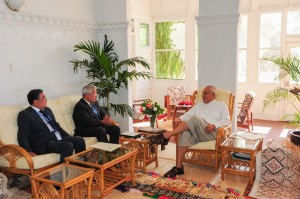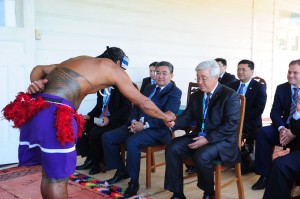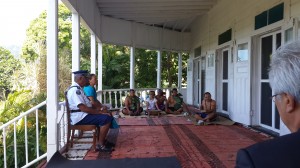In 1997, Jared Diamond wrote a Pulitzer Prize-winning book called “Guns, Germs and Steel: The Fates of Human Societies.” The book explained in easily understandable yet well-argued prose why the world turned out to be what it is today – a Europe-centric, or rather a Eurasian-centric world – and why it did not come to revolve around other civilizations in, say, the Pacific islands.
 Crediting guns, germs and steel, not to mention their stronger societal organization, Diamond explains why it was mostly Europeans that took over other continents, and not vice versa, ensuring the dominance of their values, systems of government and economic organization, etc. Yet, one of the points Diamond is keen to stress is that this dynamic of development, which has played out over past millennia, does not mean that people in Europe or in other developed countries live happier or more fulfilled lives. According to the author, while those in the West and North live more prosperous lives on paper than those in the South and East, many people in ‘developing’ countries live lives that are more content and closer to their ‘truer selves’. In other words, they live lives that make them just as happy, if not more.
Crediting guns, germs and steel, not to mention their stronger societal organization, Diamond explains why it was mostly Europeans that took over other continents, and not vice versa, ensuring the dominance of their values, systems of government and economic organization, etc. Yet, one of the points Diamond is keen to stress is that this dynamic of development, which has played out over past millennia, does not mean that people in Europe or in other developed countries live happier or more fulfilled lives. According to the author, while those in the West and North live more prosperous lives on paper than those in the South and East, many people in ‘developing’ countries live lives that are more content and closer to their ‘truer selves’. In other words, they live lives that make them just as happy, if not more.
Having just visited Samoa for the Third International Conference on Small Island Developing States (SIDS) on September 1-3, I would say that I agree with Diamond’s point, yet I would add a qualifier. As a first time visitor coming from the world’s largest land-locked country, I found that people in the Pacific are indeed as proud of their history and development – and as happy – as one can be. However, as we discussed at the Conference, the geographical isolation of the Pacific Islands creates fundamental challenges that hinder their growth and prosperity. Overcoming these challenges will bring greater happiness to the communities and benefit us all – more developed island states will mean a more developed world – it is as simple as that. But this will require concerted and sustained development assistance from the international community.
 While it may seem strange at first, Kazakhstan shares many challenges with SIDS. Just as we are land-locked, they are, in a way, sea-locked, with their encirclement by the great ocean and their remoteness from major growth hubs, aggravating, not helping their lot. This is why Kazakhstan felt it was important to participate in the event and share our story of what we, as an upper middle income country in the early years of its development, have done to overcome the challenges of geography and, more importantly, how that can be applied to support SIDS.
While it may seem strange at first, Kazakhstan shares many challenges with SIDS. Just as we are land-locked, they are, in a way, sea-locked, with their encirclement by the great ocean and their remoteness from major growth hubs, aggravating, not helping their lot. This is why Kazakhstan felt it was important to participate in the event and share our story of what we, as an upper middle income country in the early years of its development, have done to overcome the challenges of geography and, more importantly, how that can be applied to support SIDS.
That’s exactly what I shared in my remarks at the conference and in more than a dozen meetings over three intense days with delegations from around the world, including Cape Verde, East Timor, the Marshall Islands, Kiribati, Vanuatu, Nauru, and many others.
A recurring theme in my conversations and one of the greatest challenges they all share is a lack of energy resources and the resulting high cost of energy (according to UN estimates, the cost of electricity in countries such as Samoa is four times higher than in the U.S., for example). And here is an area where Kazakhstan can play a concrete and constructive role and is already pursuing a number of efforts – big and small – to help meet this challenge.
First, Kazakhstan will be hosting the international specialized exhibition EXPO 2017, which will focus on the theme of ‘Future Energy’. In three years’ time, we want to attract at least 100 countries and 10 international organizations to the event to help drive forward innovation and development in the energy sector. We hope it will make a tangible contribution to meeting the energy challenges facing the world today and that SIDs can play an important part and benefit from the event. We are working to provide support to various countries, especially SIDS, to ensure they can participate in the exhibition.
 Second, Kazakhstan has put forward the ‘Green Bridge Partnership Program’. The initiative brings together several countries, from Germany to Mongolia, to promote technology transfer and innovation in energy with the ultimate goal of finding common solutions to meet the energy needs of the international community.
Second, Kazakhstan has put forward the ‘Green Bridge Partnership Program’. The initiative brings together several countries, from Germany to Mongolia, to promote technology transfer and innovation in energy with the ultimate goal of finding common solutions to meet the energy needs of the international community.
Third, in partnership with UN ESCAP, we are launching a project to provide electricity producing biogas units to communities in nine Asia Pacific nations, including Kiribati, the Marshall Islands, Micronesia, Nauru, Palau, Papua New Guinea, Samoa, the Solomon Islands and Tonga.
Last but not least, Kazakhstan has put forward its candidacy for a non-permanent seat on the UN Security Council in 2017-2018. Our bid is based on the four pillars of food, water, nuclear and energy security. A focus on these key challenges, we believe, can help resolve the energy problems and wider issues facing SIDS and many other nations around the world.
And we are committed and will continue to pursue more ways and opportunities to promote equitable development internationally.
On a different note, during my visit to Samoa, I was often reminded of my previous engagements with U.S. Congressman Eni Faleomavaega, a good friend of Kazakhstan from the neighboring island of American Samoa. We have worked together on a matter that bonds Kazakhstan and the South Pacific close together – fighting for a nuclear weapons free world – which draws on our shared legacy of dealing with consequences of decades of nuclear weapons testing by the Soviet Union, the United States, and France. I was heartened to find that many of his traits – a love of life, openness and keen determination to achieve one’s goals – are a feature of all Pacific islanders and I greatly enjoyed their hospitality.
One of the most memorable moments of the trip was the traditional greeting ceremony ahead of our meeting with the head of state of Samoa, Tuiatua Tupua Tamasese Ta’isi Tufuga Tupuola Efi, in his residence on the hills overlooking Apia. The master of ceremonies’ call to the heavens asking for blessings for the two countries was reminiscent of the rituals we see and treasure in Kazakh culture.
The performance also reminded all of us of the theory of how humans first populated Polynesia from Asia, and it was really great to see ancient and remarkably similar traditions survive and live on. For while modern diplomacy will help us build mutually beneficial ties, it is the strength of our traditions that gives us confidence and determination to continue moving forward and towards happier lives for all.
The author is the Minister of Foreign Affairs of Kazakhstan. This opinion first appeared as a blog post on mfa.gov.kz.

